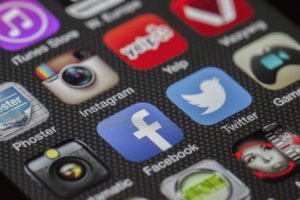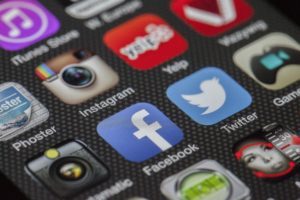
Could social media be making people more anti-social?

The social media boom continues to make it easier than ever to stay in touch with loved ones in real time. But with the flourishing of new technology and the ability to be connected to anyone and everyone at any time, real-life human interactions could be suffering a heavy blow.
A recent global study conducted by Kasperksy Lab reveals that social media users are interacting less face-to-face than in the past because of this newfound ability to constantly communicate and stay in touch online. In the study, researchers found that about one-third of people communicate less with their parents (31%), partners (23%), children (33%) and friends (35%) because they can simply follow them on social media. This may be doing more harm than good, in a world where editing one’s life to make it appear perfect is more appealing than naturally existing.
“Under certain circumstances they perceive their online communication as ‘hyper-personal communication’ and thus they can misread and over-interpret the messages on social media,” said Dr. Astrid Carolus, Media Psychologist at the University of Würzburg. “We feel especially close, we blind out the rather negative, focus on the possible positive intentions behind a message, and over-interpret.”
The study was conducted between October and November of last year among 16,750 participants, split evenly between men and women at least 16 years old from 18 countries, each of whom was surveyed online.
Participants were surveyed on the types of items they post on social media and the types of posts from others that have positive or negative influences on their moods. They were also asked about things they might do if meant obtaining more “likes” from their followers, including such things as posting salacious photos of friends or co-workers, or revealing sensitive information about someone else.
Many participants made it clear that social media made them jealous of others. Nearly 60% of the participants viewed a friend as having a better life than their own simply by seeing that friend’s social media activity, and almost half were upset after viewing photos from a friend’s happy holiday celebration.
The study also found that “people go on social media to feel better.” Half of the participants reported using the outlets as a means to post optimistic things, and 61% said they go on to post things that make them smile.
Researchers ultimately found that many people will go to harmful lengths simply to win “likes” from followers. “This study has shown us that in order to generate more likes and feel better about the time they spend on social media, people are being tempted into sharing more information; potentially putting themselves and the people they care about at risk,” the authors concluded.
Among the findings:
- 61% of the participants felt worse after finding out someone “unfriended” them, and 59% were upset after someone posted a negative or critical comment on their profile
- 57% said after going on social media they’ve felt that someone they follow has a better life than they do
- 59% felt sad after seeing photos from a party they didn’t attend posted on social media and 45% were unhappy after seeing photos from a friend’s happy holiday outing
- 58% were angered by a photo a friend posted of them online that they didn’t want made public
- 54% felt upset when no one liked or commented on a photo they posted
- 42% were jealous when they saw a friend had more likes or comments than they did on a status update
- Just 31% of people aren’t bothered by the number of likes they receive on a post
- 24% of men said they worry that if they get few like, their friends will think that they are unpopular, compared to one-in-six (17%) women
- To get more likes, 32% of men said they’d post something funny about a friend, compared to 21% of women
What do you think about this study? Do you notice social media taking a toll in your relationships?

Its just sad that people are so unfulfilled in their daily lives they need a thumbs up icon just to feel validated.
And of all Total war-games (there were a great deal),
Rome is the game that truly launched the string to effectiveness.
I was s pioneer using Facebook to network staffing event marketing events nationwide starting in 2005. I could get events staffed for indusyry agencies from a computer lab at IPFW or my house free of charge (nuts, I know)! Facebook kept deleting my accounts, telling me I was “violating terms and conditions” and that people were complaining that networking made me “a creep and a predator”. Fast forwatd to 2017, Facebook is dominated by those same hypicrite souls reinventing my wheel with impunity! I quit Facebook over two years ago having accrued thousands of “friends”, “followers”, “likes”. The vast majority I didn’t know. No worry. I don’t miss them. And, they sure don’t miss me!
These are really fantastic ideas in on the topic of blogging.
You have touched some fastidious things here.
Any way keep up wrinting.
Interesting. Very interesting.
An apple a day really does keeps the physician away.
This study is bang on. I stopped posting anything on Facebook because with nobody liking or commenting I felt that no one cared or bothered about me. So then I thought well what’s the point? Also having to read friends statuses such as “look at my new house” or “check out my vacation that I got to go on, because I’m so much more successful than you!” Was just so depressing that I unfollowed everybody.
59% felt unhappy when someone posted something negative about them? So 41% of people enjoyed it? This “study” is total crap
I find that FB messes with my mind. Worrying about stuff that doesn’t matter outside of FB. I imagine it’s pretty common. Anyway, I deactivated today. I got back on for two weeks for a certain reason, before that I was off for over 6 months. I felt so much better off it. When I got back on, it was just the same emotional politics, and I was sucked right back in again. What bugs me the most is the people who are lovely to you on the walls, “I missed you!”, but ignore you in private messages. Either I’m misreading their friendship, or everyone is just a damn tool.